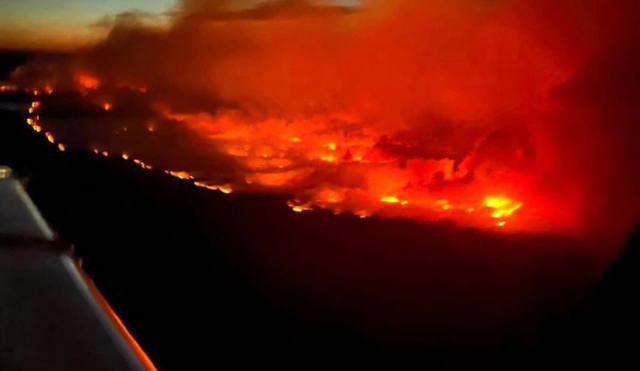News Flash
News Flash

FORT MCMURRAY, Canada, May 15, 2024 (BSS/AFP) - Thousands of residents of
Fort McMurray, a city in Canada's major oil-producing region, fled as an out-
of-control wildfire drew near and thick smoke filled the skies.
Shifting winds gusting to 40 kilometers per hour (25 miles per hour) fanned
the flames, scorching 9,600 hectares of surrounding forests as it advanced to
within 13 kilometers of the city in the western province of Alberta that had
been gutted by wildfires in 2016 -- one of the biggest disasters in the
nation's history.
Four neighborhoods were ordered to evacuate and by mid-afternoon, a highway
south was jammed with cars and trucks fleeing to safety against a backdrop of
plumes of dark smoke glowing orange in the distance.
Resident Ashley Russell was packed and ready to leave on a moment's notice,
as the rest of the city was put on alert. "I'm experiencing a lot of anxiety.
In 2016, my place burned down, so I'm reliving that," she told AFP.
"We're seeing extreme fire behavior," Alberta Wildfire spokeswoman Josee St-
Onge told a news conference.
"Smoke columns are developing and the skies are covered in smoke," she said.
"Firefighters have been pulled from the fire line for safety reasons."
Officials said the fire had grown significantly in multiple directions since
Monday.
Regional fire chief Jody Butz, however, assured residents that crews were
prepared, having cleared brush and erected fire barriers over the winter, and
that water bombers were now dropping retardant to slow its advance.
"We are confident that we have the resources to defend these areas, but we
need people out of harm's way," he said.
- Fears of 2016 repeat -
In 2016, the entire city with a population of more than 90,000 was evacuated
while production of one million barrels of oil per day -- almost one third of
Canada's total output at the time -- stopped. Canada is the world's fourth
largest producer and a leading exporter of crude to the United States.
More than 2,500 homes and businesses were razed, with damage assessed at more
than Can$3.7 billion. Thousands of residents never returned to the city.
Authorities have been bracing for another possibly devastating wildfire
season, after Canada's worst ever last year that saw flames burning from
coast to coast and charring more than 15 million hectares (37 million acres)
of land.
Dozens of zombie fires sustained by layers of dried peat continued to smolder
beneath the surface of the boreal forest through the winter, which was warmer
than usual and left a smaller snowpack, while drought has persisted across
the region.
In British Columbia, thousands of residents of remote towns remained under
evacuation orders, while CN railway on Tuesday suspended rail service between
Fort St. John and Fort Nelson, and north of High Level in Alberta "due to
wildfire activity."
Rob Fraser, the mayor of Fort Nelson told AFP: "It's cool, it's overcast and
the wind is just very slight. If everything continues like this, you know, we
just might corral this beast."
Air quality warnings, meanwhile, have been issued across Canada and the
United States as smoke from the Canadian wildfires wafted as far south as the
US state of Oklahoma and over to Quebec province in the east.